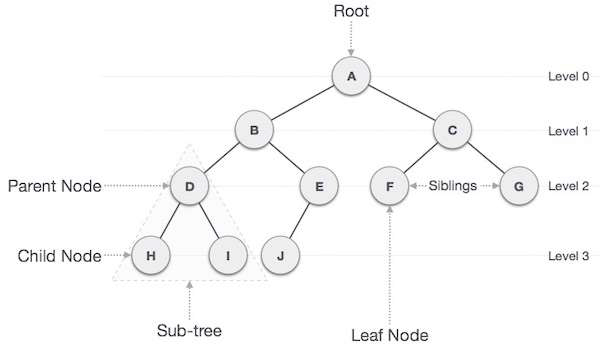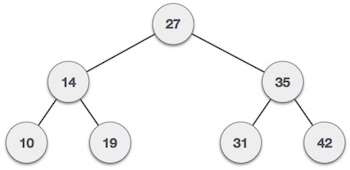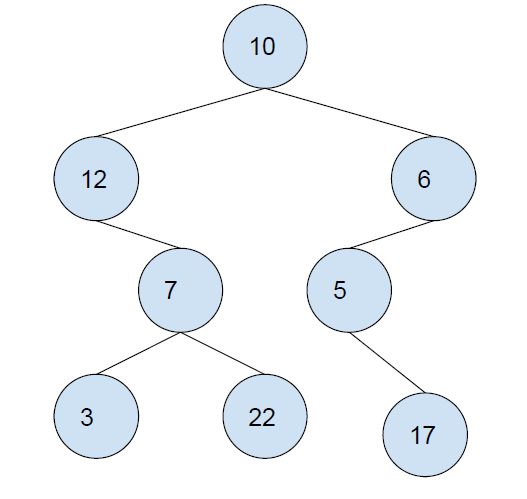
 Data Structure
Data Structure Networking
Networking RDBMS
RDBMS Operating System
Operating System Java
Java MS Excel
MS Excel iOS
iOS HTML
HTML CSS
CSS Android
Android Python
Python C Programming
C Programming C++
C++ C#
C# MongoDB
MongoDB MySQL
MySQL Javascript
Javascript PHP
PHP
- Selected Reading
- UPSC IAS Exams Notes
- Developer's Best Practices
- Questions and Answers
- Effective Resume Writing
- HR Interview Questions
- Computer Glossary
- Who is Who
Maximum sub-tree sum in a Binary Tree such that the sub-tree is also a BST in C++ program
In this problem, we are given a binary tree BT. Our task is to create a program to find the Maximum sub−tree sum in a Binary Tree such that the sub−tree is also a BST.
Binary Tree has a special condition that each node can have a maximum of two children.

Binary Search Tree is a tree in which all the nodes follow the below−mentioned properties
The value of the key of the left sub-tree is less than the value of its parent (root) node's key.
The value of the key of the right subtree is greater than or equal to the value of its parent (root) node's key.

Let’s take an example to understand the problem,
Input

Output
32
Explanation
Here, we have two subtrees that are BST. Their sum is,
7 + 3 + 22 = 32 6 + 5 + 17 = 28 Maximum = 32.
Solution Approach
A simple solution to the problem is by traversing the tree data structure and then checking at each node if it’s child nodes can form a binary Search tree or not. If we find the sum of all nodes contributing to the BST and then return the maximum of all BSTSum’s found.
Example
Program to illustrate the working of our solution,
#include <bits/stdc++.h> using namespace std; int findMax(int a, int b){ if(a > b) return a; return b; } int findMin(int a, int b){ if(a > b) return b; return a; } struct Node { struct Node* left; struct Node* right; int data; Node(int data){ this−>data = data; this−>left = NULL; this−>right = NULL; } }; struct treeVal{ int maxVal; int minVal; bool isBST; int sum; int currMax; }; treeVal CalcBSTSumTill(struct Node* root, int& maxsum){ if (root == NULL) return { −10000, 10000, true, 0, 0 }; if (root−>left == NULL && root−>right == NULL) { maxsum = findMax(maxsum, root−>data); return { root−>data, root−>data, true, root−>data, maxsum }; } treeVal LeftSTree = CalcBSTSumTill(root−>left, maxsum); treeVal RightSTree = CalcBSTSumTill(root−>right, maxsum); treeVal currTRee; if (LeftSTree.isBST && RightSTree.isBST && LeftSTree.maxVal < root−>data && RightSTree.minVal > root−>data) { currTRee.maxVal = findMax(root−>data, findMax(LeftSTree.maxVal, RightSTree.maxVal)); currTRee.minVal = findMin(root−>data, findMin(LeftSTree.minVal, RightSTree.minVal)); maxsum = findMax(maxsum, RightSTree.sum + root−>data + LeftSTree.sum); currTRee.sum = RightSTree.sum + root−>data + LeftSTree.sum; currTRee.currMax = maxsum; currTRee.isBST = true; return currTRee; } currTRee.isBST = false; currTRee.currMax = maxsum; currTRee.sum = RightSTree.sum + root−>data + LeftSTree.sum; return currTRee; } int CalcMaxSumBST(struct Node* root){ int maxsum = −10000; return CalcBSTSumTill(root, maxsum).currMax; } int main(){ struct Node* root = new Node(10); root−>left = new Node(12); root−>left−>right = new Node(7); root−>left−>right−>left = new Node(3); root−>left−>right−>right = new Node(22); root−>right = new Node(6); root−>right−>left = new Node(5); root−>right−>left−>right = new Node(17); cout<<"The maximum sub−tree sum in a Binary Tree such that the sub−tree is also a BST is "<<CalcMaxSumBST(root); return 0; } Output
The maximum sub−tree sum in a Binary Tree such that the sub−tree is also a BST is 32

